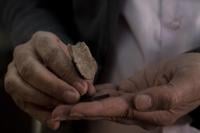BETHLEHEM, West Bank (AP) — An ivory spoon dating back 2,700 years that was recently repatriated to the Palestinian Authority from the United States has sparked a dispute with Israel's new far-right government over the cultural heritage in the occupied West Bank.
The clash brings into focus the political sensitivities surrounding archaeology in the Middle East, where Israelis and Palestinians each use ancient artifacts to support their claims over the land.
Israel's ultranationalist heritage minister has ordered officials to examine the legality of the U.S. government's historic repatriation of the artifact to the Palestinians earlier this month, and is calling for annexing archaeology in the occupied West Bank.
The artifact — a cosmetic spoon made of ivory and believed to have been plundered from a site in the West Bank — was seized in late 2021 by the Manhattan District Attorney's office as part of a
It was one of 180 artifacts illegally looted and purchased by Steinhardt that he surrendered as part of an agreement to avoid prosecution.
American officials handed an artifact over to the Palestinian Ministry of Tourism and Antiquities on Jan. 5 in what the U.S. State Department’s Office of Palestinian Affairs said was “the first event of such repatriation” by the U.S. to the Palestinians.
Dozens of Steinhardt’s surrendered artifacts have already been repatriated to Italy, Bulgaria, Greece, Turkey, Jordan, Libya and Israel. This spoon was the first and only item ever to be repatriated to the Palestinians.
The repatriation coincided with the first weeks of Israel's new government, which is composed of ultranationalists who see the West Bank as the biblical heartland of the Jewish people and inextricably linked to the state of Israel.
Heritage Minister Amihai Eliyahu’s office said last week that the legality of the repatriation “is being examined by the archaeology staff officer with the legal counsel, which will examine all aspects of the matter, including the Oslo Accords that the U.S. has signed.”
The case underscores how archaeology and cultural heritage are intertwined with the competing claims of the Israelis and Palestinians in the decades-long conflict.
“Any artifact that we know that it comes out illegally from Palestine, we have the right to have it back,” said Jihad Yassin, director general of excavations and museums in the Palestinian Tourism and Antiquities Ministry. “Each artifact says a story from the history of this land.”
The ministry is part of the Palestinian Authority, the government established as part of the Oslo Accords in the 1990s that exercises limited autonomy in parts of the Israeli-occupied West Bank.
Those agreements between Israel and the Palestinians were supposed to include coordination on a raft of issues, including archaeology and cultural heritage.
But the agreements have largely unraveled. Yassin said that the archaeology committee has not met in around two decades, and that there is virtually zero coordination between Israel and the Palestinians concerning antiquities theft prevention in the West Bank.
“We try to do our best to protect these archaeological sites, but we face difficulties,” he said.
Yassin said that around 60% of the West Bank's archaeological sites are in territory under complete Israeli military control, and that his ministry's theft prevention workers “manage to control in a high percentage the looting” in areas under Palestinian Authority control.
Nonetheless, many of the illicit artifacts that have made their way to Israel's legal antiquities market were looted from the West Bank, he said.
According to court documents, Steinhardt bought the ivory cosmetic spoon in 2003 from Israeli antiquities dealer Gil Chaya for $6,000. The artifact had no provenance — paperwork detailing where it came from and how it had entered the dealer's inventory — but Chaya said the object was from the West Bank town of El-Koum, which is under Palestinian Authority control.
Another artifact believed to have been looted from the same town, a “Red Carnelian Sun Fish amulet (that) dates to circa 600 B.C.E.,” remains missing, according to the DA's office. Steinhardt has yet to locate the item, but if it is found, it will be repatriated to the Palestinians, the office said.
last year, not including three that were seized in place Seven others meant to be returned to Israel have yet to be found. Several of the items returned to Israel are believed to have been looted from the West Bank.
The Israel Antiquities Authority declined comment on the artifact’s repatriation to the Palestinians.
Heritage Minister Eliyahu, a religious ultranationalist in Netanyahu's government now in charge of the country’s Antiquities Authority, denies the existence of a Palestinian people.
Since taking office, he has accused the Palestinian Authority of committing “national terrorism” and “erasing heritage” at an archaeological site in a Palestinian-controlled area near the West Bank city of Nablus.
It remains unclear what impact, if any, a review by the ministry's legal counsel could have. It appears unlikely Israel could confiscate the artifact from the Palestinians, but a legal opinion against the move could potentially complicate future repatriations.
Earlier this week, Eliyahu said he would be giving the Israel Antiquities Authority full control over archaeological sites, cultural heritage and theft prevention throughout the West Bank — a move that critics say would in effect apply Israeli law over occupied territory in breach of international law.
Currently, archaeological excavations and antiquities in the West Bank are managed by the Civil Administration's archaeology staff officer, which is part of the Defense Ministry. Israel has not formally annexed the West Bank, and the territory is treated as occupied and is governed under military law.
“All heritage on both sides of the green line will earn full protection, at an international and scientific standard,” Eliyahu wrote in a Facebook post on Sunday. He said the state of Israel would “act in a uniform and professional manner from the (Mediterranean) sea to the Jordan.”
Alon Arad, director of Israeli cultural heritage non-governmental organization Emek Shaveh, said that putting the Israel Antiquities Authority in charge of archaeology in the occupied territory was “activating Israeli law in the West Bank, which means annexation.”
Eliyahu’s office declined repeated interview requests.
Yassin said that for the time being, the artifact will remain at the ministry, where it will be studied by one of its archaeologists. Then, he said, it will be displayed at one of the West Bank's museums.
“It's not the only one," Yassin said. "It is the beginning."








































